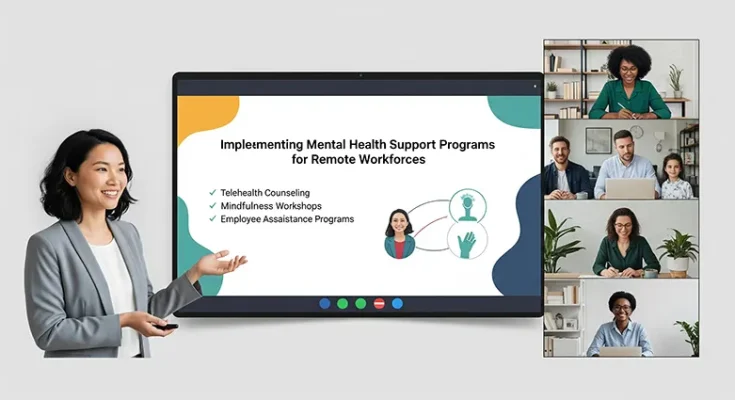The rise of remote work has transformed traditional workplace dynamics, offering flexibility and autonomy to employees worldwide. However, while remote work offers numerous benefits, it also presents unique challenges, particularly concerning mental health. Feelings of isolation, blurred work-life boundaries, and reduced social interaction can adversely affect the psychological well-being of remote employees. To address these challenges, organizations must prioritize implementing mental health support programs for remote workforces. This article explores effective strategies for establishing these programs to foster a healthy, resilient remote work environment.
Why Mental Health Support is Critical for Remote Workforces
Remote work can contribute to increased stress, anxiety, and burnout due to factors such as:
- Social isolation from limited face-to-face interactions
- Difficulty separating work from personal life leading to overworking
- Reduced access to informal support networks and resources
- Uncertainty and disruption to regular routines
These issues underscore the need for targeted mental health programs that cater specifically to the realities of remote employees, ensuring they have access to supportive resources and tools to maintain good mental health.
Key Strategies for Implementing Mental Health Support Programs
1. Assess Employee Needs and Preferences
Before rolling out any mental health initiatives, organizations should conduct surveys or focus groups to understand the specific needs and preferences of their remote workforce. This ensures that the programs developed are relevant, accessible, and genuinely helpful.
2. Provide Access to Virtual Counseling and Therapy Services
Partnering with mental health professionals to offer confidential virtual counseling sessions gives employees a critical outlet for managing stress and mental health concerns. Some organizations may provide Employee Assistance Programs (EAPs) that include these services at no cost to the employee.
3. Launch Awareness and Education Campaigns
Promoting mental health awareness empowers employees to recognize symptoms of stress and anxiety and encourages open conversations. Webinars, workshops, and informational newsletters can help destigmatize mental health issues in the remote workplace.
4. Encourage Regular Check-Ins and Social Interaction
Managers should establish routine one-on-one virtual check-ins to monitor employee well-being and performance. Facilitating virtual social events, such as coffee chats or team-building activities, combats feelings of isolation and strengthens team cohesion.
5. Promote Work-Life Balance Practices
Encourage employees to set clear boundaries between work and personal time. Providing guidelines around flexible working hours, encouraging regular breaks, and respecting off-hours can minimize burnout and promote mental wellness.
6. Implement Mindfulness and Stress-Reduction Programs
Incorporate mindfulness training, guided meditation sessions, or stress management apps as part of the mental health support toolkit. These resources can be easily accessed remotely and offer practical techniques to manage anxiety.
7. Train Managers on Mental Health Awareness
Equip managers with training to recognize signs of mental distress and respond effectively and empathetically. A mentally healthy remote workforce requires supportive leadership that prioritizes employee well-being.
Benefits of Mental Health Support Programs for Remote Workforces
Effective mental health support can lead to:
- Increased employee engagement and productivity
- Lower absenteeism and turnover rates
- Enhanced job satisfaction and morale
- A supportive organizational culture that attracts talent
By proactively addressing mental health challenges, organizations not only support their employees but also create a more resilient and sustainable workforce.
As remote work continues to be a significant part of the modern workplace, implementing mental health support programs for remote workforces is no longer optional—it is essential. Organizations that invest in comprehensive mental health initiatives tailored to remote employees will foster improved well-being, boost productivity, and cultivate a positive work culture. Prioritizing mental health is a win-win strategy that benefits both employees and employers in the long term.





